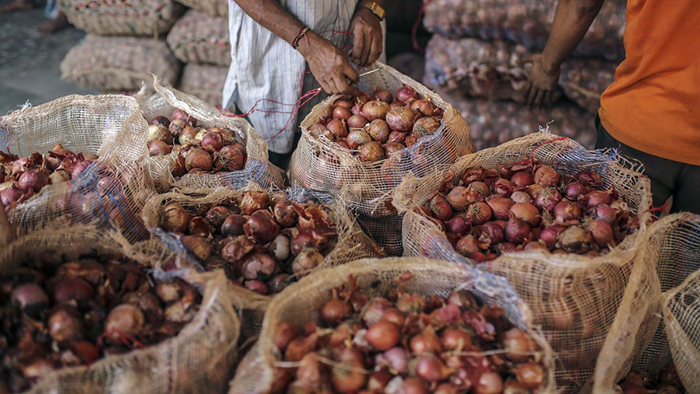Shortage of Onions Threatens a New Chapter in Global Food Crisis

The world is facing yet another chapter in the global food crisis with the recent shortage of onions threatening nutrition and forcing governments to take action to protect supplies. Soaring prices at the vegetable market have left consumers and retailers feeling the pinch, with the shortage being felt across various countries, from Morocco to the Philippines.
The primary cause of the shortage is the extreme weather conditions that have plagued vegetable harvests across different regions. Spain and Morocco, which are the primary sources of salad stock for the UK over the winter period, have been hit by a range of adverse weather events, including floods, snow, and hail. Consequently, the majority of the winter salad supplies for the UK have been affected, leading to empty supermarket shelves and rationing of key items like tomatoes, peppers, cucumbers, lettuce, salad bags, broccoli, cauliflower, and raspberries.
While fresh fruit and vegetables are generally affected by the shortage, not all products have been impacted. In the UK, for instance, only the items grown in glass houses have been affected, according to the National Farmers’ Union (NFU).
Aside from the weather conditions abroad, UK farmers have also been hit by rocketing gas and fertilizer prices, which have significantly affected production. The NFU has warned that production of salad ingredients in the UK is set to fall to the lowest levels on record since 1985 due to the rising costs.
The current shortage is not a new phenomenon. In 2017, poor growing conditions in Europe, mainly Italy and Spain, led to a lack of vegetable stock in UK supermarkets. Experts estimated that the shortage would cost UK supermarkets at least £8 million.
The global food crisis is a significant concern, and the shortage of onions is just one aspect of it. Food insecurity has been a growing issue in recent years, with climate change, population growth, and other factors significantly affecting food production and distribution. It is crucial to find sustainable ways to address the issue, including investing in climate-resilient agricultural practices, supporting small-scale farmers, and improving global food systems.
In conclusion, the shortage of onions and other vegetables is a significant concern, threatening nutrition and impacting the global food supply chain. It is essential to address the root causes of the shortage and find sustainable solutions to prevent future food crisis.

HOW THIS MIGHT AFFECT INDIA?
It is possible that the shortage of onions and other vegetables in the UK and other countries could lead to an increase in demand for Indian exports. India is one of the largest producers of onions in the world, and it could potentially benefit from the shortage in other countries by exporting more onions to meet the increased demand.
However, it is also worth noting that India itself has faced its own challenges with onion production and supply in the past, such as in 2019 when onion prices skyrocketed due to a shortage caused by heavy monsoon rains damaging crops. This led to a significant impact on domestic consumers and resulted in the Indian government taking measures to curb rising prices, such as importing onions from other countries and imposing export bans.
Therefore, while it is possible that the shortage in other countries could have a positive impact on Indian onion exports, it is also important to consider the potential impact on domestic consumers and the need for effective measures to address any supply and demand imbalances.
———
#vegetableshortage #globalfoodcrisis #poorweather #nutrition #Spain #Morocco #UK #saladsupplies #emptyshelves


